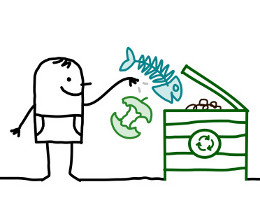The following article takes you through some of the benefits of composting and lets you in on the reasons why it is important. Continue reading for more details.

Nature has a unique mechanism set in place wherein everything in nature decomposes, and in that way, automatically recycles as well. This process of waste material decomposing is known as composting whereby natural waste material is taken and then broken down into simpler substances with the help of microorganisms.
The waste that is used is all natural and ranges from food waste, leaves, grass, manure, paper, wood, and other natural resources. In a controlled environment, certain components need to be present for the composting to be successful, namely―moisture, temperature, oxygen, organic matter, and microorganisms (fungi, bacteria). The waste is collected and the microorganisms are introduced. These feed upon the waste and convert it to a simpler medium. What comes about as a result of this is known as compost and the entire process of converting waste to compost is called composting. Compost in itself is a rich product and is introduced to the soil to improve its quality and support plant growth.
There are several benefits of composting that range over varied fields and functions. Here are some of the important ones.
Improving Soil Quality
Composting creates the all-natural compost which acts to improve soil quality by providing it with additional nutrients and hones the quality of holding onto those nutrients. It therefore has a direct effect on plant growth and helps the plants to thrive better. Addition of compost to the soil also helps the soil to lock in moisture and thereby help in improving the soil quality further.
Environmentally Friendly
By composting, one helps in recycling the waste which would've otherwise been simply discarded. By doing that it helps in preventing pollution as well as the production of methane gases which are formed when waste is treated at treatment plants. Thus, it improves the quality of the environment as well.
Fertilizer
The compost acts as a great fertilizer and manure and therefore helps to save money because it eliminates the need to buy expensive and unnatural fertilizers from the market. Many people use worm composting for this purpose.
Clear Landfills and Waste Streams
The waste that is discarded fills up the landfills and water streams. If that same waste is converted into compost, it takes away from the act of adding more pollution to the environment by keeping the landfills free. Along with that there is less pressure on the local municipalities as well because there is less waste to treat.
Safer Home
Learning how to compost at home is an advantage because it helps to get rid of the harmful wastes. The accumulation of wastes is a threat to health because it provides a medium for pests to thrive on and thereby spread diseases. If the waste is not allowed to collect, then it directly means that there will be no pests and therefore no diseases. Get or build yourself a compost bin and you're set.
These are the varied benefits of composting. As is clearly seen, these range over several forms and types and benefit in various spheres. Plus it's not time-consuming and leads to saving money. Take some time out and learn how to make a compost pile.






 Nature has a unique mechanism set in place wherein everything in nature decomposes, and in that way, automatically recycles as well. This process of waste material decomposing is known as composting whereby natural waste material is taken and then broken down into simpler substances with the help of microorganisms.
Nature has a unique mechanism set in place wherein everything in nature decomposes, and in that way, automatically recycles as well. This process of waste material decomposing is known as composting whereby natural waste material is taken and then broken down into simpler substances with the help of microorganisms.